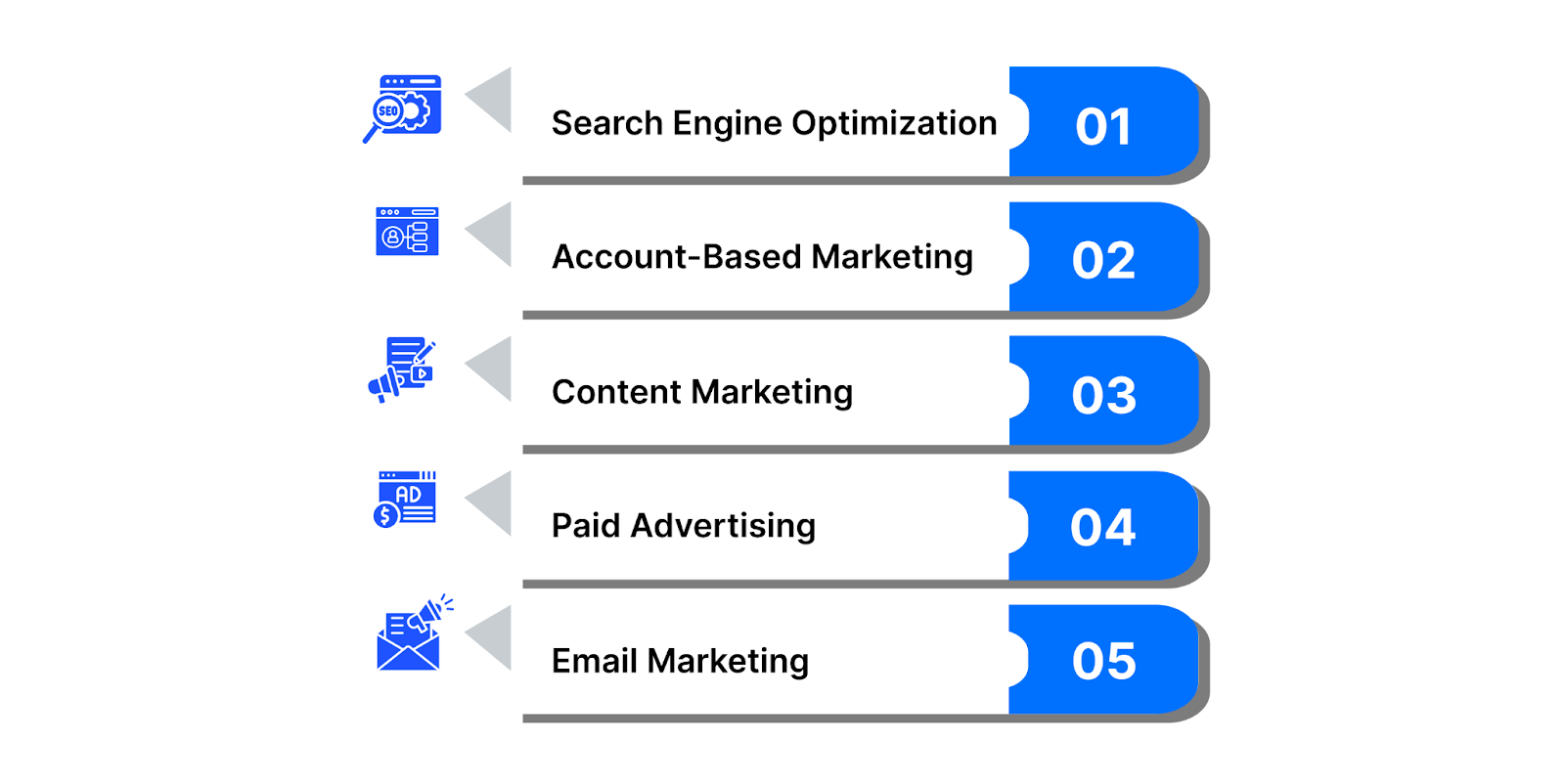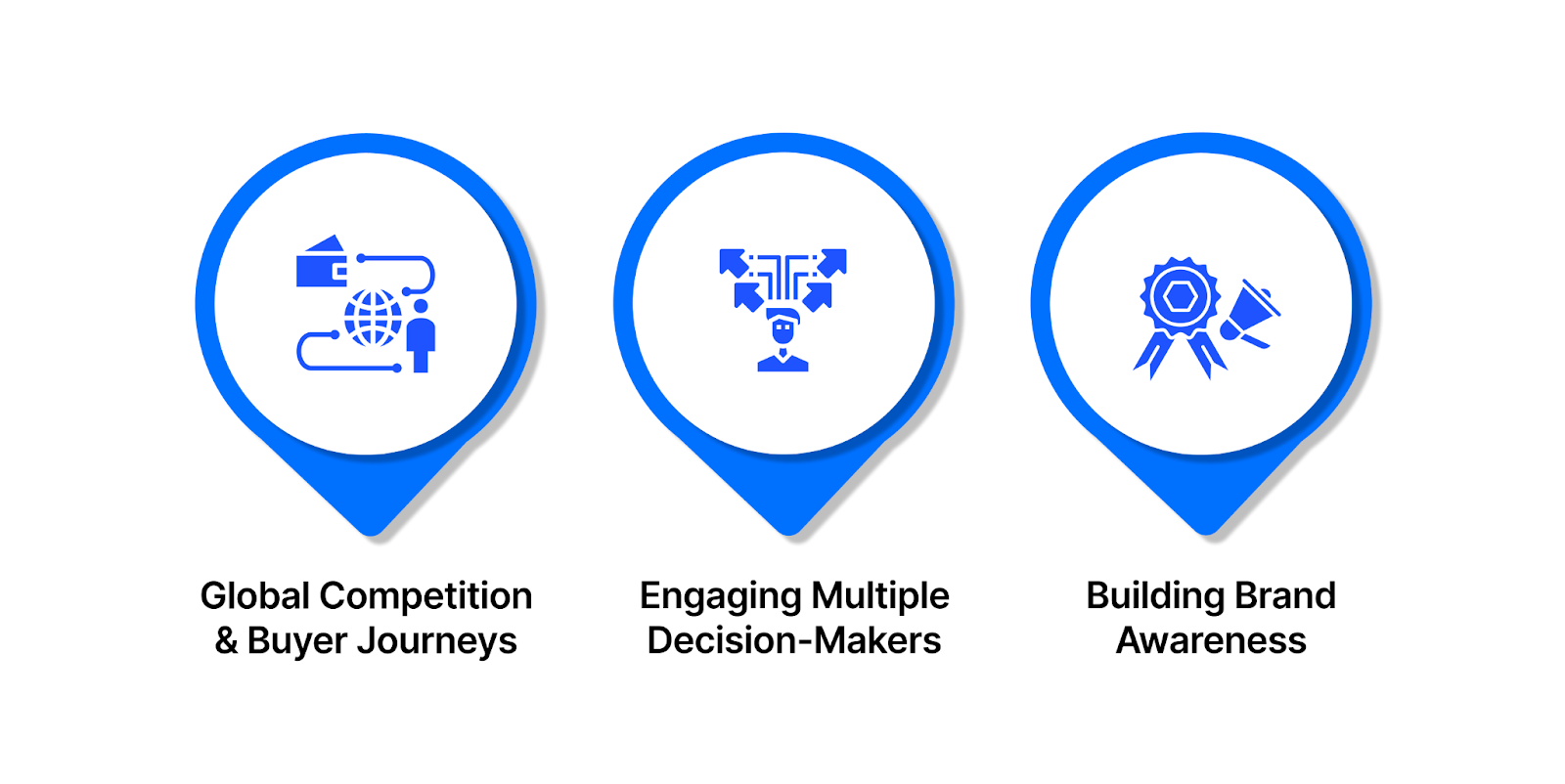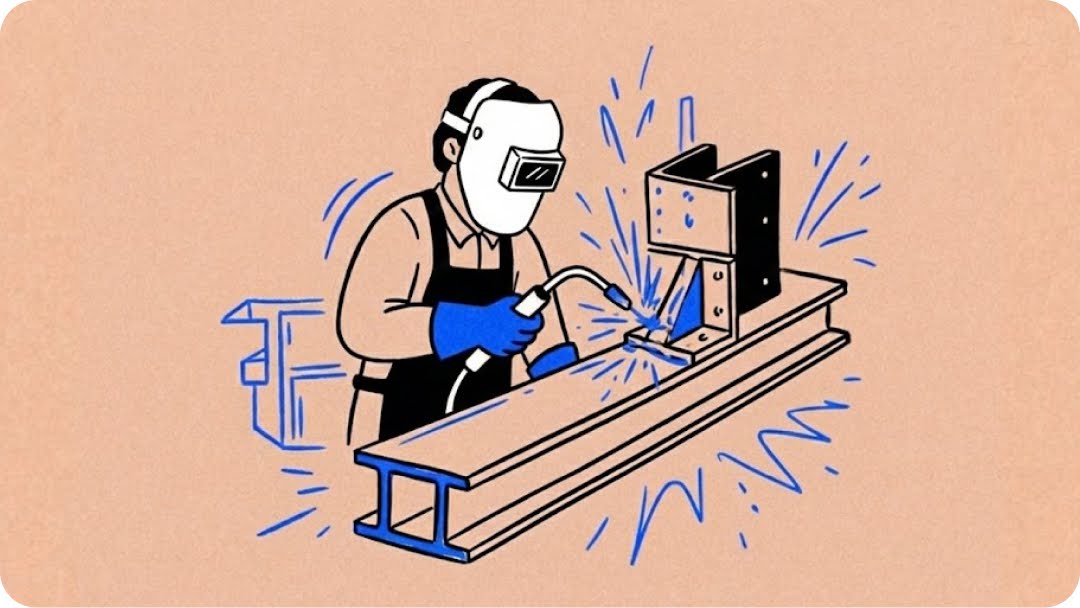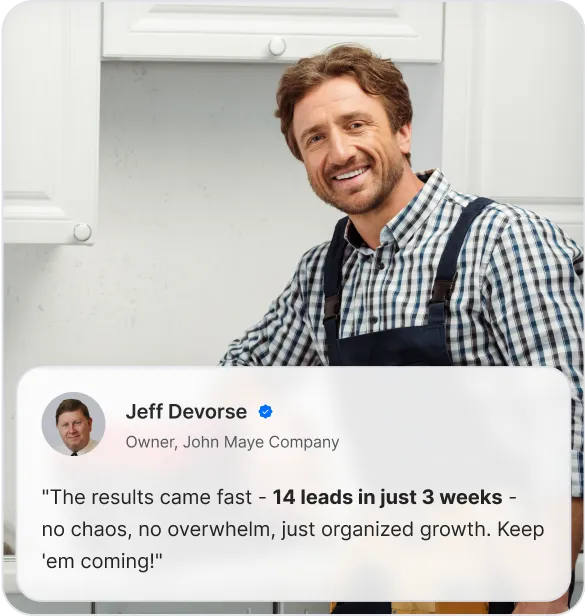You know how much time and money goes into building your manufacturing setup: the machines, the raw material sourcing, the dealer relationships. Yet, when it comes to your marketing, the return never matches the effort. You might get a few random inquiries, but hardly any from the kind of clients who buy in volume or understand your capabilities.
That’s because the people searching for you, engineers, distributors, or procurement teams, can’t actually find you online.
SEO is how you bridge that gap. It’s what helps your business appear when a buyer looks for exactly what you make.
In this article, we’ll break down five proven digital marketing strategies for plastics and rubber manufacturing that will help you generate leads, build trust, and grow your business long-term.
What is Digital Marketing?
Digital marketing is the simple idea of making your business easy to find online. When someone types on Google looking for the kind of products you make, your company should appear right in front of them.
Think of it as another salesperson on your team. One that works all day, every day. It shows your products, explains what you do, and connects you with buyers, even when you’re not at the factory or office.
In plain terms, digital marketing helps your business:
- Get noticed by the people who are actually looking to buy
- Clearly show what you manufacture and how it helps your customers
- Bring in direct calls or messages from genuine buyers who already need your products
Why Do You Need It for Plastics Manufacturing?
1. Buyers don’t look in directories anymore.
They use Google. If your business doesn’t appear there, they’ll end up calling another supplier, maybe one with a smaller setup than yours, but better online presence.
2. Your website can bring daily business.
Just like your machines work daily to produce materials, your website can quietly bring in new orders when it’s set up the right way.
3. It saves time and effort.
You don’t need to depend only on dealers or exhibitions. When buyers can find you online, you get direct business without extra travel or middlemen.
4. It helps buyers trust you faster.
When someone sees your products, factory photos, and certifications online, they feel confident calling you instead of someone they’ve never heard of.
5. It keeps you ahead of other manufacturers.
The ones getting steady orders online didn’t just get lucky. They made their business easy to find. You can do the same with the right setup.
5 Digital Marketing Strategies for Plastics and Rubber Manufacturing

Digital marketing helps you stay visible throughout that journey, attract qualified leads, and build trust even before your first sales call.
Let’s walk through five digital strategies that can fuel consistent growth for your manufacturing business:
1. SEO (Search Engine Optimization)
Let’s start with the foundation: SEO. This isn’t just a buzzword; it’s what determines whether your company shows up when buyers search for products you manufacture.
Think about your potential customer: a purchasing manager looking for a rubber gasket supplier, or an engineer searching for custom injection molding services. They type these terms into Google. If your site doesn't appear near the top of the search results, you may not even get considered.
Effective SEO for plastics and rubber manufacturing involves:
- Keyword Research: Identify what your buyers are searching for. Terms like “custom rubber molding services,” “plastic extrusion supplier,” or “thermoplastic components manufacturer” may be highly relevant.
- On-Page Optimization: Strategically place keywords into your page titles, meta descriptions, URLs, headers, and content while keeping it natural and informative.
- Technical SEO: Your website should load fast, be fully mobile-friendly, and have proper security (HTTPS), as search engines reward technically sound websites.
- Content Creation: Develop in-depth, helpful content that answers common questions and provides solutions related to your products and services.
- Link Building: Earn quality backlinks from trusted industry directories, partners, or associations to build domain authority.
- Local SEO: Optimize your Google Business Profile to capture searches in your geographic region, which is essential for manufacturers with local or regional operations.
The result? Consistent, qualified traffic from buyers actively searching for exactly what you offer.
1. Account-Based Marketing (ABM)
Not all leads are equal. In B2B manufacturing, a few large contracts can make a major difference. That’s where Account-Based Marketing (ABM) shines.
ABM is a highly focused approach where your marketing and sales teams work together to target a short list of ideal, high-value companies. Instead of casting a wide net, you’re fishing with a spear.
Here’s how it works:
- Identify Ideal Accounts: Use data from existing clients, sales records, and market research to pinpoint companies that would be a perfect fit.
- Build Personalized Campaigns: Craft highly customized marketing messages that directly address each target company’s specific needs, pain points, and product requirements.
- Sales-Marketing Alignment: Ensure your sales and marketing teams are fully aligned, sharing information and coordinating outreach to these key accounts.
- Leverage CRM and Analytics: Use CRM systems and data-driven tools to track buyer behavior, engagement levels, and decision-maker activity.
For plastics and rubber manufacturers, ABM helps you land long-term, bulk purchase clients such as:
- Automotive OEMs
- Electronics manufacturers
- Medical device companies
- Large distributors
ABM improves resource efficiency, shortens sales cycles, and often delivers higher ROI compared to traditional lead generation.
2. Content Marketing
Buyers want to work with manufacturers who demonstrate expertise, and content marketing helps you do exactly that.
By creating educational, industry-specific content, you not only attract potential customers but also position your company as a trusted authority. This is especially important in plastics and rubber manufacturing, where buyers may need to understand complex processes, material choices, and production capabilities.
Types of content that work:
- Product & Process Blog Posts: Explain manufacturing processes like injection molding, extrusion, thermoforming, or custom compounding. Compare materials like PVC vs. polypropylene or silicone.
- Technical Articles: Discuss compliance standards, certifications, material properties, and evolving regulations relevant to plastics and rubber manufacturing.
- How-To Guides & Whitepapers: Help purchasing teams evaluate material choices, process options, or quality assurance factors when sourcing parts.
- Videos: Provide visual insights into your manufacturing plant, machinery, or quality control processes to demonstrate expertise and scale.
- Product Comparisons: Create honest, detailed comparisons between product types, materials, or manufacturing methods to simplify the buyer’s decision-making.
This type of content serves multiple purposes:
- Improves your SEO rankings.
- Builds buyer trust during their research phase.
- Generates leads through calls-to-action, downloadable resources, and inquiry forms.
3. Paid Advertising (PPC)
While SEO and content build long-term growth, paid advertising gives you instant visibility, particularly for highly targeted search terms.
Pay-per-click (PPC) platforms like Google Ads, LinkedIn Ads, and even Facebook Ads (for local B2B audiences) can be extremely effective for plastics and rubber manufacturers.
How PPC works for your business:
- Google Search Ads: Appear at the top of search results when buyers search for services like “plastic injection molding supplier” or “custom rubber components.”
- Display Ads: Use visual banner ads that appear across websites visited by your target industries or accounts.
- LinkedIn Ads: Reach B2B decision-makers such as purchasing managers, operations heads, or procurement teams by job title, industry, or company size.
- Retargeting Ads: Re-engage visitors who previously viewed your website but didn’t submit an inquiry, keeping your business top-of-mind.
PPC allows you to:
- Capture active buyers who are ready to purchase.
- Promote seasonal offers, new products, or certifications.
- Test messaging and offers quickly before scaling efforts.
To maximize ROI, it’s critical to continuously monitor ad performance, track conversions, and refine targeting based on real results.
4. Email Marketing
Many manufacturing sales cycles take months. That’s why email marketing is so effective — it allows you to stay in front of your leads while they move through the decision-making process.
Email marketing helps you:
- Nurture Prospects: Provide helpful resources, case studies, and product updates that guide prospects toward a purchase.
- Maintain Relationships: Stay connected with past customers who may need future orders or additional products.
- Announce Updates: Inform your audience about new certifications, expanded capabilities, or equipment investments.
- Personalize Messaging: Segment your email lists by industry, location, or client type to send relevant content.
Some practical email campaign ideas include:
- Monthly industry newsletters.
- New product launch announcements.
- Case studies showing successful client projects.
- Educational series explaining manufacturing processes or material selection.
Be sure to use a proper email platform that allows list segmentation, automation, and performance tracking. And of course, respect privacy regulations — only email recipients who have opted in to receive your content.
Best Tips to Strengthen Your Strategy
Influencer Marketing for Industry Credibility
In manufacturing, influencers aren’t necessarily social media celebrities. Instead, they’re respected industry experts, trade association leaders, or technical consultants who hold credibility with your target audience. Partnering with these voices can help expand your brand reach and build trust quickly.
Google Business Profile Optimization for Local Search
Don’t overlook local SEO, even if you serve a national or international market. Claim and optimize your Google Business Profile with:
- Accurate contact information.
- Service categories.
- High-quality photos.
- Customer reviews.
- Regular updates and posts.
This helps you rank better in local search results and improves your online authority.
Unique Challenges and Solutions in Plastics & Rubber Manufacturing Marketing

Digital marketing for plastics and rubber manufacturing brings a unique set of obstacles. Understanding these challenges is the first step toward developing strategies that actually work in the real-world B2B manufacturing environment.
Addressing Global Competition and Complex Buyer Journeys
Buyers today can access global suppliers, leading to longer, more complex research processes. To stand out, capture attention early with valuable content, clear service explanations, and strong digital visibility.
Reaching Multiple Decision-Makers in the Sales Process
Sales in manufacturing involve many decision-makers, like engineers, procurement, operations, finance, and executives. Your marketing must address their concerns around cost, quality, compliance, and ROI, offering tailored content for each.
Overcoming Limited Brand Recognition
Specialized manufacturers often have limited recognition outside their current base. Consistent digital marketing boosts visibility and establishes authority, helping you reach potential buyers even if they haven’t heard of your brand before.
By addressing these challenges head-on, your marketing doesn’t just attract attention; it earns trust across complex, global supply chains.
Showcasing Capabilities and Enhancing Online Presence
You may have state-of-the-art manufacturing capabilities, but if your website doesn't reflect them clearly, you lose potential business before conversations even start.
Here’s what you can do best:
1. Translating Physical Capabilities into Digital Content
Use your website to visually and verbally demonstrate your expertise. Showcase your machinery, processes, certifications, and project capabilities through detailed service pages, factory tour videos, high-quality photos, and technical resources that make complex information easy to digest.
2. Strategies for Multilingual Content and Regional Pages
If you serve international markets, create region-specific pages with localized content. Offering content in multiple languages, adjusted to local regulations, measurements, and industry standards, helps you connect more effectively with global buyers.
3. Importance of Clear Brand Positioning
Buyers must immediately understand who you serve, what you produce, and why you’re the better choice. A clear brand message helps differentiate you from competitors and removes hesitation from buyers unfamiliar with your company.
A strong digital presence translates your factory floor into an online sales asset that speaks directly to the buyers you're trying to reach.
Wrapping Up
Today, it’s no longer enough to simply have the best capabilities; your market needs to find you, trust you, and engage with you at the right moment. Digital marketing is not a side project; it’s the system that drives your business forward every single day.
When executed correctly, these strategies don't just drive short-term leads — they create ongoing pipelines of high-value opportunities, stronger customer relationships, and long-term revenue growth.
At Gushwork, we’ve helped businesses achieve 38X growth in organic visitors within a year, with search impressions growing 68X — simply by aligning content with how real buyers search and make decisions.
The opportunity is right in front of you. If you're ready to position your manufacturing business for consistent, compounding growth, Gushwork can help you build the digital engine that powers it. Let’s get started — book a call today!

















.webp)



.webp)








.webp)
.svg)


.svg)
.svg)
.svg)




.svg)




.svg)